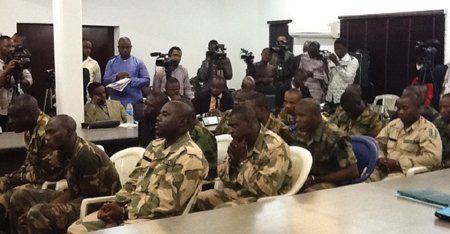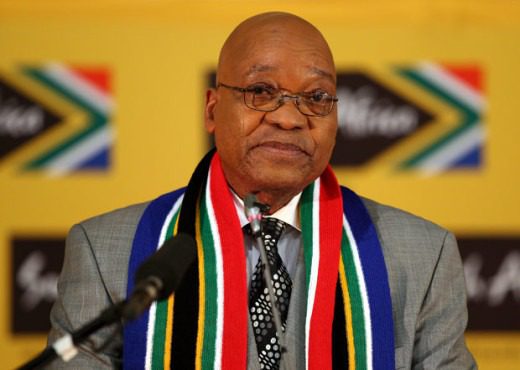National Issues
Insurgency: Mutiny not rationale behind our failure -By Sunday Eze

One serious deviant act within the military and which of course attracts disastrous consequences is mutiny. It has become a subject of public debate after a military court martial late 2014 handed down death sentences to 13 out of the 18 soldiers for firing shots at the General Officer Commanding the newly created 7 Division of Nigerian Army, Maj. Gen. Ahmadu Mohammed in Maiduguri.
What is mutiny and at what stage is a soldier believed to have committed mutiny? Section 52 (1, a & b) of the Armed Forces Act, 1994, posits that a person subject to service law under this Act, “who takes part in a mutiny involving the use of violence or the threat of the use of violence … refusal or avoidance of any duty or service against, or in connection with operations against the enemy, or the impeding of the performance of that duty or service; or to disobey the authority … is guilty of an offence under this subsection and liable, on conviction by a court-martial, to suffer death.”
The soldiers involved in the mutiny were reportedly unhappy while their morale was low. They complained of insufficient food, ammunition and allowances and the refusal of the military hierarchy to rotate troops for a long time since their deployment to combat Boko Haram terrorists in the North- East. Most importantly, they were angry over the killing of their colleagues ambushed in Chibok on the night of May 13, 2014 and the arrival of their corpses which coincided with the visit of the GOC of Division 7 Nigerian Army, Major Gen. Ahmadu Mohammed. With this situation how do they boldly force the insurgents to pay for their audacity?
Which employer of labour will work and survive under the above condition of service? Has the military hierarchy addressed these salient issues of welfare raised by the mutineers which are key elements of industrial dispute before and after setting up these courts martial? The military should first of all courtmartial those rationale behind the mutiny like mistrust, endemic corruption, ethnic and religious factors especially in the fight against insurgency.
Moreover, the nation should consider the opinion of Robert McNamara which states that “…any country that seeks to achieve adequate military security against the background of acute food shortages; population explosion, low level of productivity, fragile infrastructural base for technological development, inadequate and inefficient public utilities and chronic problem of unemployment, has a false sense of security.” The military is a responsible vital organ of government, the pride, strength and dignity of the nation, therefore, cover-up and chasing shadows should not be an option at the moment.
No sane nation toys with the welfare of her armed forces. If the needs of this group who stake their lives to protect the territorial integrity of the nation are allowed to be relegated to the background or overshadowed by the smokescreen/politics of court martial, it amounts only to postponing the evil day.
The way and manner this military behaviour is handled will confront and point the way forward to those factors militating against winning the war against terrorism. The alleged lackadaisical attitude and compromising stand of some senior military officers in the fight against Boko Haram especially in Maiduguri and the entire North East should be investigated too for possible court martial. Military and civilian members of the public whose actions and inactions have left the nation at the mercy of a rag-tag group of insurgents should be an interesting case for police/military investigations.
Every public service comes with its condition of service. The Armed Forces Act is an aggregation of rules guiding the operations of the armed forces of the federal republic of Nigeria. It is a body of principal laws strictly meant to be obeyed by all soldiers who incidentally subscribe to it under the military service law. Part XII of the Act clearly defined various offences and the attendant consequences upon infraction.
The mutineers explicitly failed to take refuge under Section 179(2)(4) of the Armed Forces Act (Redress of Complaints) which states that; “If a soldier, rating or an aircraftman thinks himself wronged in any matter by his commanding officer, either by reason of redress not being given to his satisfaction on a complaint under subsection (1) or of any other reason, he may make a complaint with respect thereto to any Army, Naval or Air Force officer… provided he/she shall first exhaust the administrative remedies available to him under this section before embarking on any other action.”
The military service rules and procedures are too secretive or impenetrable for public appreciation. Therefore, they need urgent reforms adaptable to civil environment and general operational efficiency. First, there should be an easy, quick and systematically laid down channel of redressing complaints especially in Joint Task Force (JTF) environment other than through an officer who might even be the reason behind the complaint. Second, opinion boxes should be provided at these bases for collation of data on operational efficiency and needs of officers and men. Third, the chief of defence or army staff should as a tradition pay impromptu visits to JTF and other military formations with the possibility oftaking complaints and gauging the general impulses of the rank and file as it relates totheir duties.Fourth, appropriate sanctions should be visited across board on any saboteur military personnel despite his rank or position.
Fortunately, there is a window of opportunity in section 149 of the same Military Act to appeal decisions of court martial even to the High Courts. Those already sentenced are therefore encouraged to take advantage of this window to ventilate their arguments.





















